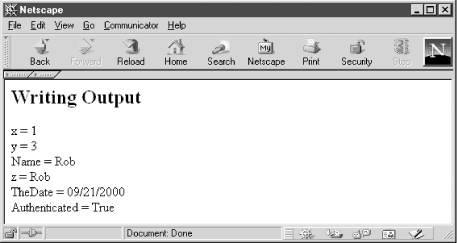Writing Output
To
output the contents or results of a ColdFusion expression, you use
the <CFOUTPUT> tag.
CFOUTPUT is a paired tag, which means that it has
both start and end tags. CFOUTPUT tells ColdFusion
to parse any text found between the tag pairs for variables and
expressions that need to be evaluated. We’ll use the
CFOUTPUT tag in a variety of ways throughout the
book; it is one of the most commonly used CFML tag. For now,
let’s focus on how the CFOUTPUT tag outputs
simple variable values.
The following example creates a number of variables using
CFSET tags and then outputs the values of the
variables within CFOUTPUT tags:
<!--- assign values to variables ---> <CFSET x = 1> <CFSET y = x+2> <CFSET Name = "Rob"> <CFSET z = Name> <CFSET Authenticated = True> <CFSET TheDate = DateFormat(Now( ),'mm/dd/yyyy')> <!--- output the variable values ---> <H2>Writing Output</H2> <CFOUTPUT> x = #x#<BR> y = #y#<BR> Name = #Name#<BR> z = #z#<BR> TheDate = #TheDate#<BR> Authenticated = #Authenticated#<BR> </CFOUTPUT>
Executing this template causes the value assigned to each variable to
be output to the browser, as shown in Figure 2-3.
Note the use of pound signs (#) in this example.
ColdFusion uses pound signs to separate expressions from literal
text. When ColdFusion encounters an expression surrounded by pound
signs, it attempts to evaluate it.

Figure 2-3. Writing output using the CFOUTPUT ...
Get Programming ColdFusion now with the O’Reilly learning platform.
O’Reilly members experience books, live events, courses curated by job role, and more from O’Reilly and nearly 200 top publishers.

